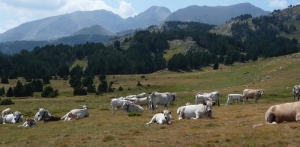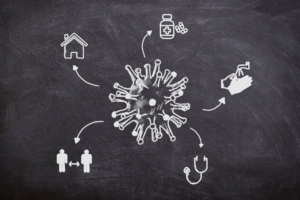Food hygiene during coronavirus – your questions answered
Food hygiene during coronavirus is a subject which is on everyone’s mind.
- What precautions should you take when returning from shopping?
- Is it necessary to cook food to destroy the virus?
- Can we eat raw fruits and vegetables as they are?
If you’ve been wondering about how to maintain food safety in the face of the coronavirus, the Agence Nationale de Sécurité Sanitaire de l’alimentation, de l’environnement et du travail (ANSES) has issued guidelines on food hygiene. Based on the scientific data currently available, ANSES has examined the possibilities of transmission of Covid-19 through food. Here are their answers to the most frequently asked questions.
Can farm animals get sick and infect us?
 There is no evidence that farm animals and their feed play any role in the spread of the virus that causes Covid-19. Transmission by food is possible only if it is contaminated by a sick person or a person infected with the virus, by handling it with soiled hands, or by exposing it to infectious droplets when coughing and sneezing.
There is no evidence that farm animals and their feed play any role in the spread of the virus that causes Covid-19. Transmission by food is possible only if it is contaminated by a sick person or a person infected with the virus, by handling it with soiled hands, or by exposing it to infectious droplets when coughing and sneezing.
Can eating contaminated food make us sick?
There is currently no scientific evidence to suggest that the virus can infect us via the digestive tract. However, the possibility of infecting the respiratory tract when chewing contaminated food cannot be completely excluded. If you are ill, you should absolutely avoid handling food and cooking for others.
How can you remove the virus from fruit and vegetables?
After purchase, before eating or cooking them, you should wash your fruit and vegetables well. Clean water is enough; do not use detergent or disinfectant such as bleach, as you risk poisoning yourself if the food is poorly rinsed. It is not necessary to use white vinegar to rinse fruits and vegetables. After washing with clean water, wiping food with a single-use paper towel helps to remove any viral particles. This is especially important when fruit and vegetables are eaten raw.
Can we eat raw fruits and vegetables as they are? Should they be cooked?
As mentioned in the previous question, it is important to wash your fruits and vegetables in clean water. You can also peel them as you would apples or pears. For vegetables, you should know that cooking at 63°C – i.e. over medium heat – for 4 minutes is enough to destroy any virus that may be present. There is no point in “overcooking” your food, unless the recipe or your personal tastes demand it ! For raw vegetables, washing with clean water is enough to reduce the risk of transmission by cross-contamination – i.e. the risk of transmitting the virus via the hands.
Do these hygiene rules also apply to packaging?
Packaging may have been contaminated by soiled hands. While the virus causing the disease cannot survive for more than 3 hours in the open air, cleaning the packaging is still an additional precaution. Packaging should be cleaned with a damp cloth or single-use paper towel. It is not necessary to use bleach. For foods that can be stored in the refrigerator, the packaging should if possible be removed before storing. Of course, hands should be thoroughly cleaned before and after handling these packages.
Is white vinegar effective for cleaning packaging?
This is effective for killing bacteria but probably less effective for viruses. Studies have shown that to get rid of more resistant viruses, white vinegar is ineffective.
What precautions should I take when I return from shopping?
First of all, wash your hands. You can let your groceries stay where th ey are for two or three hours after bringing them home provided they are not chilled. For packages of products that need to go in the refrigerator such as milk or yogurt, remove the outer wrapping and clean the products with a damp paper towel before putting them in the refrigerator. Remember to wash your hands again immediately afterwards.
ey are for two or three hours after bringing them home provided they are not chilled. For packages of products that need to go in the refrigerator such as milk or yogurt, remove the outer wrapping and clean the products with a damp paper towel before putting them in the refrigerator. Remember to wash your hands again immediately afterwards.
Should I warm my bread?
Bread is baked at a high temperature during preparation, which eliminates all traces of viruses. Provided hygiene rules are followed in the bakery (regular hand washing and/or wearing gloves when serving, use of a bag when displaying the bread, etc.), there is no risk of transmitting the virus. It is not necessary to heat the bread if all hygiene precautions have been followed.
Is it possible to contract Covid-19 through contact with contaminated surfaces?
Some studies carried out under conditions very different from those in the home have shown that the virus remains active for a reasonably long time on inert surfaces. It survives up to 72 hours on plastic and stainless steel. It remains detectable for 24 hours on cardboard under the same experimental conditions. The risk of touching the virus when handling objects that have been contaminated by a carrier (vector) is theoretically possible, but is low. This is why it is important to follow certain rules: do not touch your face while shopping, wash your hands when you return home and wipe the packaging with a damp paper towel.
How do I clean potentially contaminated surfaces?
In order to clean potentially contaminated surfaces, household products that remove all traces of the virus must be used. For example, you can use 70°C alcohol, which is very effective, to disinfect door handles, computer or tablet keyboards. If you use bleach, use this product with care as it is highly oxidizing and caustic to the skin, mucous membranes and materials. Any telephone, in direct contact with hands and face, can therefore be a major vector for transmission of the virus. You can use disinfectant wipes or paper towels soaked in household alcohol to disinfect the screen of your smartphone.
If you want to keep up with the latest French government information on Covid-19 you might find our glossary of coronavirus-related vocabulary useful.

